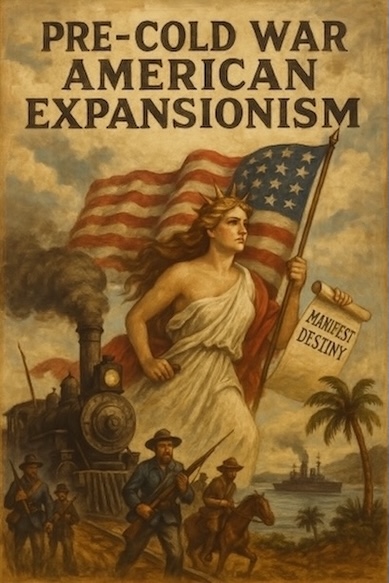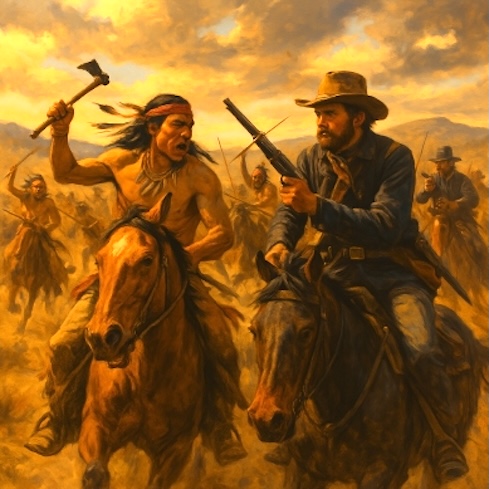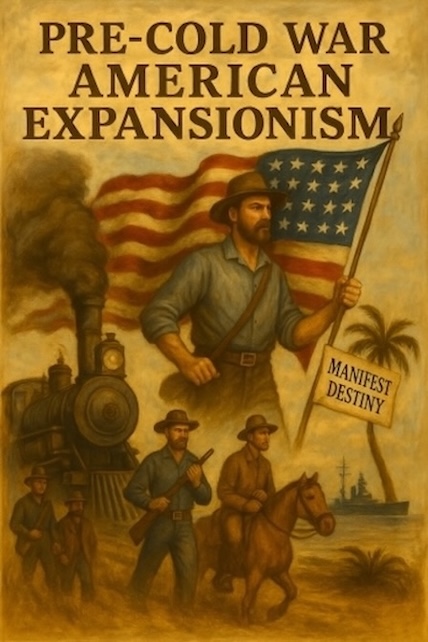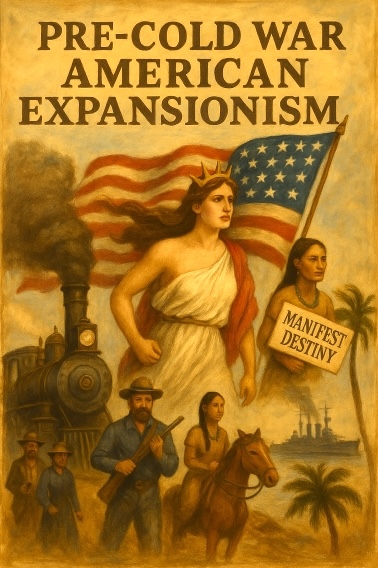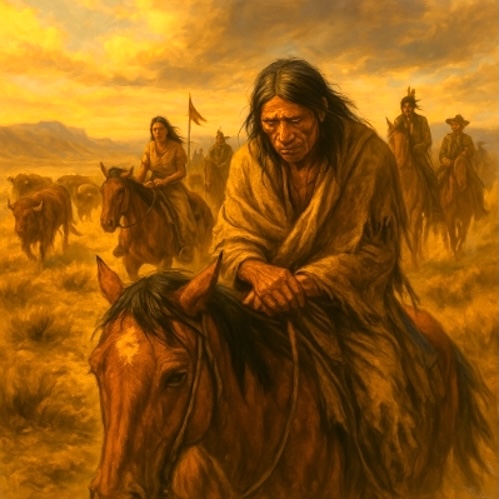Pre-Cold War American Expansionism: Imperial Influence Beyond Borders!
The Pre-Cold War American Expansionism was a sort of a puzzle and a tragedy! The claim for foundation and expansion is challenging and when you consider such attempts claimed to spreed democracy, then you will have to freeze!
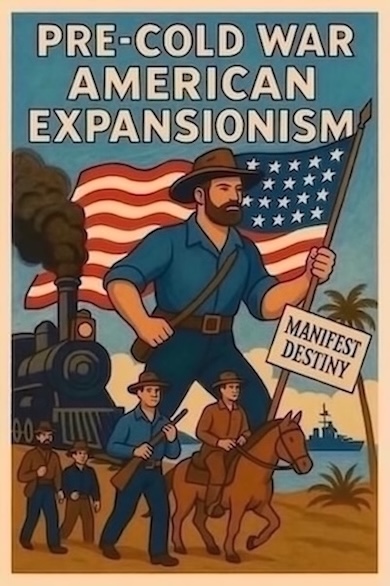 Pre-Cold War American Expansionism: The cowboys expanding in indigenous lands in their conquest to stretch and acquire more lands, driven by economical interests... a process through which America was created.
Pre-Cold War American Expansionism: The cowboys expanding in indigenous lands in their conquest to stretch and acquire more lands, driven by economical interests... a process through which America was created.This page connects seamlessly to a broader collection... about 14 interconnected pages, all designed to illustrate recurring events and their ties to economic interests. I encourage you to explore these related pages to grasp the full economic connection and recognize how history continuously shapes future events. The question remains: when will we finally break this historical cycle?
- Why Expanding Horn Africa to Include Other States and Global Impacts?
- A New Era of Chaos and Distrust is Shaping!
- Pre-Cold War Era of Colonialism & Imperial Rivalries!
- Pre-Cold War American Expansionism!
- The Cold War Era: A Battle of Ideologies and Influence!
- Why Do Nations Fragment When Unity is Their Greatest Strength?
- The Sudanese Muslim Brothers and the U.S. have Created Int Terrorism!
- Eritrea Was Too Late to Independence Due to Colonial Conspiracies!
- Namibian Road to Independence From Liberation to Sovereignty!
- The Post-Cold War Era: A Shifting Global Landscape!
- How Economics, Ideology, and Geopolitics Fragment Nations and Create New Ones?
- New World Order: Stability or Chaos?
- Why Am I Saying A New Era of Disorder and Doubts is Shaping?
Pre-Cold War American Expansionism: How That wasn't a Colonization?
While the United States positioned itself as an anti-colonial force in the 20th century, its history of territorial expansion before the Cold War tells a different story. From the doctrine of Manifest Destiny to the acquisition of overseas territories, American imperial ambitions evolved through military intervention, economic dominance, and strategic control. To read what acquisition really means read Acquisition is a Capitalist
The U.S. positioned its territorial growth as distinct from European colonialism, arguing that its expansion was based on principles of democracy and liberty rather than imperial conquest. This rhetoric was particularly strong in the 19th and early 20th centuries, as the U.S. acquired new territories such as Texas, California, Alaska, Hawaii, Puerto Rico, Guam, and the Philippines.
While the United States positioned itself as an anti-colonial force in the 20th century, its history of territorial expansion before the Cold War tells a different story. From the doctrine of Manifest Destiny to the acquisition of overseas territories, American imperial ambitions evolved through military intervention, economic dominance, and strategic control.
Throughout the 19th and early 20th centuries, the U.S. justified its growth as a mission to spread democracy and civilization rather than imperial conquest. However, its actions often mirrored traditional colonial strategies.
Manifest Destinyy (1840s–1890s) and Continental Expansion:
In the 19th century, the idea of Manifest Destiny the belief that the U.S. was divinely ordained to expand westward drove the annexation of lands stretching to the Pacific.
The displacement of Indigenous populations and the acquisition of territories such as Texas, California, and the American Southwest after the Mexican-American War were foundational aspects of U.S. expansionism.
The Spanish-American War and Overseas Empire:
By the late 19th century, U.S. ambitions extended beyond its continental borders. The Spanish-American War (1898) marked America’s emergence as a colonial power. The victory granted the U.S. control over Puerto Rico, Guam, and the Philippines territories that were governed with imperial policies.
While Puerto Rico remained under American rule, the Philippines underwent a brutal war for independence before transitioning into a semi-autonomous U.S. protectorate.
Economic Imperialism in Latin America:
Unlike European colonial powers, the U.S. often favored indirect control through economic dominance. In Latin America, U.S. corporations backed by military interventions played a significant role in shaping economic structures, particularly in Central America.
The infamous "Banana Republics" were prime examples of American influence, where nations like Honduras, Nicaragua, and Guatemala saw their economies controlled by U.S. companies such as the United Fruit Company.
The Pacific and Strategic Military Presence:
In the Pacific, U.S. expansionism was defined by military strategy. Hawaii’s annexation in 1898 secured a crucial naval base, while American Samoa and other island territories were integrated into U.S. military logistics. The Pacific served as both a commercial gateway and a geopolitical stronghold leading into World War II.
Legacy and Transition into Cold War Influence:
By the time the Cold War began, the U.S. had shifted from territorial expansion to ideological dominance, using military alliances, economic aid, and covert interventions to influence nations globally. While traditional colonialism faded, American expansionism transformed into a strategic network of influence, ensuring its global footprint remained firmly intact.
This trajectory of American expansionism set the stage for Cold War-era interventions across Asia, Latin America, and the Middle East. It wasn’t the traditional colonial model... but it was an imperial force nonetheless.
The Manifest Destiny: Conquest to Conquer, Annex & Spread Ideology for Democracy!
What a democratic logic was that?
The Manifest Destiny (1840s–1890s) was a powerful belief in the 19th-century United States that justified territorial expansion across North America. It was the idea that Americans were divinely destined to spread civilization, democracy, and progress across the continent... often at the expense of indigenous peoples, Mexico, and other nations.
Key Aspects of Manifest Destiny
- Divine & National Mission: Supporters argued that expansion was not just a political or economic necessity but a moral obligation. The belief was rooted in a sense of American exceptionalism, the idea that the U.S. had a unique destiny to guide the world toward liberty.
- Westward Expansion & Native American Displacement: As settlers moved westward, indigenous tribes faced forced removals, violent conflicts, and loss of land—most notably with policies like the Indian Removal Act (1830) and events like the Trail of Tears.
- Annexation of Texas & the Mexican-American War (1846–1848): The doctrine fueled the annexation of Texas and the justification for war with Mexico. The U.S. won, acquiring vast new territories, including California, Arizona, and New Mexico.
- Oregon Trail & Territorial Expansion: Manifest Destiny also motivated expansion into Oregon, Utah, and other western regions. Pioneers traveled dangerous routes seeking new opportunities, often under government encouragement.
- Alaska & Overseas Influence: Though mainly a continental concept, the expansionist spirit extended beyond North America, influencing acquisitions like Alaska (1867) and America’s growing interest in the Pacific and Caribbean.
Impact & Criticism
While Manifest Destiny promoted American pride and progress, it also justified wars, displacement, and racial hierarchies. Many critics argue that it was simply an excuse for aggressive imperialism under the guise of moral duty. Indigenous peoples, Mexicans, and others often resisted American expansion, leading to decades of conflict.
Point to Discus in the Manifest Destiny!
Consider these points to take to challenge what you have read about the Manifest Destiny!
The claims of spreading democracy and civilisation are not justifiable when a nation spread, conquer and annex other lands. The American cause the land was new, when discovered by the Spanish.
Some resources indicate that the idea of the U.S. expansion was driven by democracy while also involving annexation and territorial control is a fundamental tension in American history.
The justification came from the belief that American institutions, representative government, individual freedoms, and capitalist economics were inherently superior to European colonialism.
Rather than ruling territories indefinitely under an imperial system, the U.S. often framed its expansion as a temporary measure to stabilize regions and prepare them for self-governance.
So, how in many cases, this self-governance was delayed or outright denied? This exposes the imperial nature of the expansion. Now can any state decide to get out of the U.S.?
Here are some example to examine:
- The Philippines (1898–1946): After the Spanish-American War, the U.S. claimed it was guiding the Philippines toward independence. Yet, Filipino resistance was met with military suppression. Independence didn’t come until 1946, decades after U.S. control began.
- Puerto Rico & Guam (1898–Present): Unlike the Philippines, these territories remain under U.S. jurisdiction without full statehood or independence, raising questions about how democratic the process really was.
- Hawaii (1898): The annexation of Hawaii was framed as necessary for strategic and economic reasons, but it disregarded the sovereignty of the Hawaiian Kingdom.
- Mexico & Native American Lands: Manifest Destiny led to territorial acquisitions through war and forced removals. The justification was often that settlers brought governance and economic progress while ignoring the displacement of indigenous peoples.
Ultimately, the U.S. used democratic rhetoric to differentiate itself from European colonial empires, but the mechanisms of expansion with military conquest, economic control, and strategic annexation resembled colonial practices. The contradiction between claiming anti-colonialism while practicing expansionism is one of the most debated aspects of American history.
The Interesting Comparison Between U.S. and Soviet Expansion!
* I asked a friend of mine, how can any great state in the world expand in the expenses of local people's lives, hurting them and subjecting them to their rules and slave them and then claims all of that is for spreading democracy and educate and civilize people?
- You're raising a deep ethical and geopolitical question. When powerful states expand, whether through conquest, ideology, or influence, the consequences ripple through history. The U.S. and the Soviet Union both pursued expansionism, but the methods and justifications differed significantly.
My friend explained that strangely, comparing between the U.S. expansion and the Soviet expansion (I'll get to it later):
Comparing U.S. and Soviet Expansion
1. Territorial Expansion vs. Ideological Expansion:
- The U.S. expanded through territorial acquisitions (Manifest Destiny, Spanish-American War, Pacific holdings) and later through economic and political influence in Latin America, Asia, and the Middle East.
- The Soviet Union's expansion was driven by ideological control, spreading communism through direct annexation (Baltic States, Eastern Europe) and political/military dominance (Warsaw Pact nations, influence in Asia, Africa, Latin America).
2. Justifications & Rhetoric:
- The U.S. framed expansion as spreading democracy and capitalism, often positioning itself as an anti-colonial power, though critics argue it behaved similarly to old empires.
- The USSR justified expansion as liberating workers from capitalist oppression, though Soviet control often came through authoritarian means, suppressing dissent.
3. Methods of Control:
- U.S. influence was largely through military interventions, economic dependencies, and political alliances, such as the Marshall Plan and NATO.
- The Soviet Union enforced control through military occupation, communist puppet governments, and secret police repression (such as in Hungary 1956, Prague Spring 1968).
4. Resistance Movements & the "Wake-Up" Factor:
- Many U.S. territories have pushed back for independence or autonomy (Philippines, Cuba, Puerto Rico), and resistance still exists in places like Guam.
- The Soviet Union collapsed partly because its satellite states “woke up,” leading to revolutions across Eastern Europe (1989–1991), showing the limits of enforced ideological expansion.
* The Ethical Dilemma of Power States:
- Your ethical concern is valid... whether expansion comes through war, ideology, or influence, it risks exploitation and instability. When annexed peoples “wake up,” history shows they often seek sovereignty, leading to revolutions, conflicts, or renegotiations of power. The U.S. and Soviet models reflect two competing ways of exerting influence, but both faced resistance over time.
* Why those power states don't leave those people alone? Why they always want to be controlling? Can they just exist without having to pursue controlling this world?
- If expansionist tendencies continue globally today, the question becomes: Is there a way for powerful states to exist without forcing influence on others? That’s the challenge modern geopolitics wrestles with. What do you think? Do you see this pattern repeating in today’s world?
* I'll answer this in a new page... So, keep connecting with the HOA Political Scene Network.
The Global Dynamics Are Your Guide to Understand the World!
The Global Dynamics get you through many crises inherited from the colonization era, some of which are still making troubles in many places in this miserable world. In addition it show the solutions in the Action Guide. Just go through these International Dynamics and you will get it. Here are the sections of the Universal Dynamics:
Pre-Cold War American Expansionism: From Colonial Empires to Space Frontiers: Lessons Unlearned [Latest on The Insight Lens: May 9, 2025] Support me here Incredible videosPre-Cold War American Expansionism: U.S.-China Trade Talks: A Swiss Reset! [Latest on The Insight Lens: Sunday, May 11, 2025] Support me here Follow the Insight Lens
Pre-Cold War American Expansionism: Trade Wars - Trump's Tariffs Tango: Strategy or Show? [The Insight Lens: 2025-04-25]
Pre-Cold War American Expansionism: China's Gadget Powerhouse vs. Trade Wars: Who Really Pays? [Latest on The Insight Lens: 2025-04-19]
Pre-Cold War American Expansionism: China's Gadget Powerhouse vs. Trade Wars: Who Really Pays? [Latest on The Insight Lens: 2025-04-19]
Pre-Cold War American Expansionism: Robot Anchor Reports: Trade War Tensions & Market Reactions! [Latest on The Insight Lens: 2025-04-23]
Pre-Cold War American Expansionism: The World is Heating Amid Trade Wars – A Crisis Ignored! [Latest on The Insight Lens: 2025-04-24]
Pre-Cold War American Expansionism: Trade Wars - Trump's Visa Crackdown: Impact on International Students [The Insight Lens: 2025-04-18]
Pre-Cold War American Expansionism: Trade Wars - Trump Tariffs: Protests, Politics, and Future Impacts! [Latest on The Insight Lens: 2025-04-18]
Pre-Cold War American Expansionism: Biovians Speak: Trade Wars & Climate Crisis Through Nature’s Voice [The Insight Lens: 2025-04-24]
Pre-Cold War American Expansionism: Robots Delivering Breaking News: Today's Global Highlights! [The Insight Lens: 2025-04-25]
Pre-Cold War American Expansionism: Trade Wars from History to Cultural Shock! [Latest on The Insight Lens: 2025-04-19]
Pre-Cold War American Expansionism: Trade Wars Reflect The Hidden Agenda of Free-Market Capitalism! [Latest on The Insight Lens: 2025-04-19]
What Do You Think of "Pre-Cold War American Expansionism"?
Your answer to the question: What do you think of the "Pre-Cold War American Expansionism" will provide more depth to the discussions in this network. I don't mind of you have another point of view. Having other perspectives can be good to start a positive discussion. This is a free opinion network.
Have A Great Story About This Topic?
Do you have a great story about this? Share it!
Did you get any of my books from Apple Books?
Click here to tell me & get some free books. Fill the form.
رواية "الموتُ شرقاً" تكشف لك سرّ الموت الشرقي التراجيدي المستمر للإنسان
احصل علي الرواية الآن واكتشف إنهيار القواسم المشتركة، واستلهم إبداعا يشبه الأسطورة في النص الروائي
"Follow", "like", "tweet", or "pin" the pictures to express your love! Thanks
TweetHorn Africa's Political Tragedy
Love in the Internet Time on Apple Books
Rising of the Phoenix Poetry on Apple Books
Free Poetry Picture Book
Free poetry picture book on Apple Books. You can use the images on public places for your customers to enjoy, while taking coffee.
The French & Spanish Versions
You can work the French versions and the Spanish versions of the two books above with me on, one on one bases. Contact Us.
HOAs Political Poetry Imaged
I'll be thankful, if you get one of my books.
My Books!
Publish Your BookLet's be the publishers of your book. Use the form at Contact Us.

